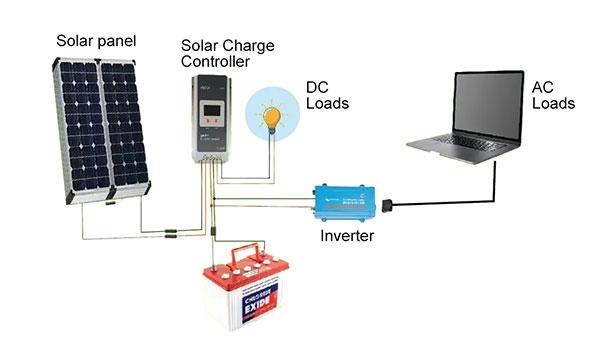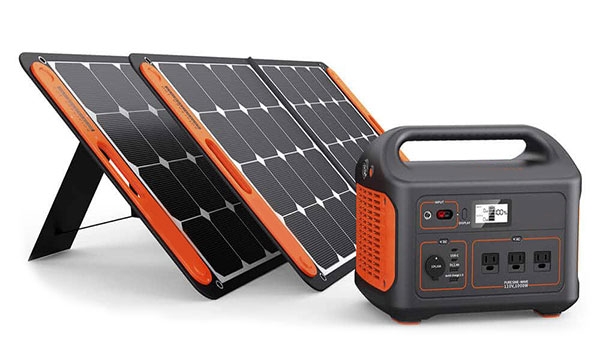A solar generator, also known as a solar inverter integrated machine, operates by harnessing energy from solar panels (photovoltaic modules) to generate electric current under solar radiation. This electricity is stored in batteries through a solar controller and then inverted from direct current (DC) to pure sine wave alternating current (AC) at 220V 50Hz using a grid frequency inverter. This AC output is used to power AC loads.
Compared to traditional small-capacity gasoline generators, solar power generators offer several advantages. Since they do not involve mechanical work in the power generation process, there is no mechanical wear and tear, resulting in a quiet operation. The absence of noise contributes to a more pleasant and environmentally friendly power generation experience.
Working Principle of Solar Generator
The operation of a solar power generator involves three main processes: photovoltaic effect, direct current (DC) conversion, and energy storage.
Photovoltaic Effect
Firstly, solar generators utilize the photoelectric effect to convert sunlight into electrical energy. Photons in sunlight can excite semiconductor materials in luminescent cells, causing electrons to be excited from the valence band of atoms to the conduction band, forming electron hole pairs. In this way, a potential difference will be formed at both ends of the photovoltaic cell, resulting in the generation of current.
DC to AC Conversion
Secondly, through direct current conversion, the solar generator converts the direct current output from the photovoltaic cell into alternating current for daily use. This process is achieved through an inverter. The inverter will convert the direct current output from the solar generator into alternating current to meet the power supply needs of electrical equipment.
Energy Storage
Finally, in solar generators, energy storage is also necessary for use during periods of insufficient solar energy or at night. This process is achieved through the battery pack. Solar power generation opportunities store excess electricity in battery packs for future use. When electricity is needed, the stored energy can be removed from the battery pack for power supply.
Advantages of Solar Generator
- Unrestricted Power Supply: Independent, location-free, and fuel-free, with short construction periods and flexible scalability.
- Environmentally Friendly and Reliable: Causes no pollution, offers safety and reliability, noise-free, aesthetically pleasing, low failure rates, and long lifespan.
- Easy Installation and Mobility: Simple assembly, convenient mobility, low installation costs, seamless integration with buildings, and no need for high-voltage cable infrastructure.
- Versatile Applications in Remote Areas: Widely applicable to various electrical appliances, ideal for homes in power-deficient or off-grid areas, including rural, grassland, mountainous, island, and remote highway locations.
- Permanence with Solar Existence: Permanent usability as long as the sun exists, providing a long-term return on investment.
- Unparalleled System Scalability: Ranges from small household systems to large-scale power stations, offering unmatched versatility compared to other power sources.
Applications of Solar Generator
Home applications: Solar generators can be used for home power supply and can provide electricity for household appliances. Especially suitable for remote areas or areas lacking electricity resources.
Commercial applications: Solar generators are also widely used in commercial fields, such as hotels, shopping malls, office buildings, etc. These places can use solar generators to reduce reliance on traditional electricity, save energy costs, and meet environmental requirements.
Agricultural applications: Solar generators also have important application value in the agricultural field. Agricultural irrigation, greenhouse power supply, and agricultural market lighting can all use solar generators to provide electricity, reducing the use of traditional energy sources
Emergency rescue: In emergency rescue situations, solar generators can provide power support for medical equipment, communication equipment, etc., helping rescue work more efficient.
Notes for Solar Generator

- Although residential solar power systems produce direct current (DC), they can still pose risks due to their significant power output, especially during daylight hours. After installation and debugging by professionals, refrain from touching or modifying critical components.
- Prohibit flammable liquids, gases, and explosive materials near residential solar power equipment to prevent explosions and damage to solar photovoltaic modules.
- Avoid obstructing solar panels during operation, as shading even a part of the photovoltaic modules significantly reduces the power output and shortens their lifespan.
- Regularly clean the dust on the inverter box using a vacuum cleaner or a soft brush. Use dry tools to prevent electrical hazards. Clean the dirt inside the ventilation holes if necessary to prevent overheating and damage to the inverter.
- Do not step on the surface of solar photovoltaic modules to prevent damage to the toughened glass.
- Avoid contact with the heat dissipation device of the inverter to prevent burns.
- Periodically clean the snow on the surface of solar panels using a brush, avoiding the use of hard objects on frozen ice to prevent damage to the module surface.
- Install the inverter in a cool and well-ventilated place, avoiding exposure to direct sunlight or poor ventilation.
These guidelines edited by Power Home provide a comprehensive understanding of solar generators and ensure their safe and effective use in various applications.
(1).png)
(1).png)